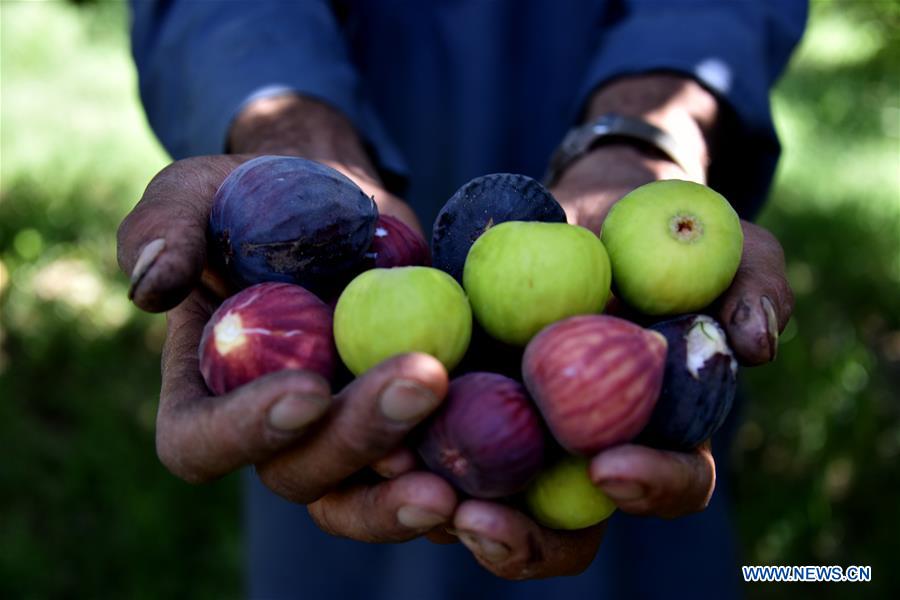
Photo taken on Sept. 3, 2020 shows freshly harvested figs at a garden in Arghandab district of Kandahar province, Afghanistan. (Photo by Sanaullah Seiam/Xinhua)
KANDAHAR, Afghanistan, Sept. 3 (Xinhua) -- "I am very satisfied with the outcome of the figs collected from my gardens. It's been drastically life-changing for me," Hajji Abdul Hai, a 52-year-old resident of the Shah Walikot district in southern Afghanistan's Kandahar province, told Xinhua.
Collecting figs from trees along with a daily wager in his garden, Hai said he earned around 300,000 afghani (about 4,000 U.S. dollars) last year by selling figs and is hopeful to earn more this year.
Hai said that a decade ago he used to go to neighboring countries for work, but over the past couple of years he has been able to increase his income by selling figs on the home soil.
Figs, according to Hai, have been used as traditional medicine, becoming popular over the past few years in Kandahar and the neighboring Zabul and Helmand provinces.
"Many farmers prefer planting figs alongside pomegranates in their gardens in Kandahar and its vicinity," Hai explained, saying the sales price at local markets are reasonable. The price of 1 kg of fresh figs nowadays is 100 afghani (1.30 U.S. dollars) and 1 kg of dried figs costs 800 afghani (10.36 U.S. dollars) at local bazaars, Hai said.
According to Hai, the main reason for the continued insurgency in Kandahar and adjoining areas is poverty and joblessness. If the government provides job opportunities by developing agriculture and horticulture sectors, many insurgents would give up fighting to work on their lands and gardens, he said.
"The poor and poverty-stricken people including militants who work on poppy fields for their families would definitely work on fig gardens to earn a living through legitimate means," Hai suggested.
Once a hotbed of Taliban militants, Kandahar was among the most insecure provinces a decade ago, but the situation, according to Hai, has changed and the province has been relatively peaceful over the past couple of years due to investment and more job opportunities for people related to the development of agricultural-related business and the creation of industrial parks.
Echoing Hai, another farmer Sharafudin, 26, described figs as a lucrative fruit that can be sold easily in local bazaars.
However, Sharafudin, who was seen collect figs from trees in his garden, called upon the local authorities to further support the farmers and find wider markets for their produce.
Only in the Shah Walikot district, more than 15,000 tons of figs would be harvested this year, according to a local official.
"The farmers in the Shah Walikot district will harvest more than 15,000 tons of figs in the current year," the Deputy for the Kandahar Chamber of Commerce, Abdul Baqi Bana, told Xinhua. He also predicted that the total amount of figs harvested in Kandahar in the current year would reach 250,000 tons.
Kandahar figs, according to the official, are exported to countries including China, the United Arab Emirates and India.
The local authorities would support farmers to grow figs and any other fruits that are helpful for supporting and boosting the local economy in the province, Bana said. Enditem